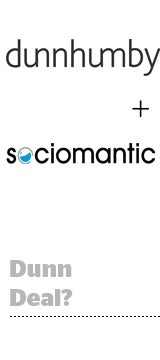 Dunnhumby, a data and customer insights company owned by British grocery giant Tesco, is close to acquiring Berlin-based retail retargeter Sociomantic Labs, sources say.
Dunnhumby, a data and customer insights company owned by British grocery giant Tesco, is close to acquiring Berlin-based retail retargeter Sociomantic Labs, sources say.
Business Insider first reported the rumored deal Thursday and estimated the deal size to be between $175 million to $200 million.
Although dunnhumby and Sociomantic have not publicly announced the transaction, sources with knowledge of both companies have confirmed to AdExchanger a deal is nigh.
If the deal goes through, dunnhumby would be gaining a demand-side platform (DSP) with strong ties to the retail and travel verticals. Sociomantic in recent months has been ramping up its mobile, revenue management and CRM capabilities.
Sociomantic CEO Jason Kelly, former CRO of Admeld, acquired by Google in 2012, told AdExchanger in a recent interview that “ecommerce is typically dependent upon the agency to execute media and we’re coming in and saying, ‘We can do all that for you.’”
Sociomantic last fall formalized a partnership with Revenue Management Systems to synchronize customer data with travel inventory intelligence to help suppliers like airline companies gain targeted reach with consumers.
As Kelly had explained it, “We connect revenue management data to help drive ecommerce, so that’s kind of where Sociomantic, as a platform and services company, fits in. It’s saying, you actually don’t need the agency because we’ll also do the creative and it’s dynamic, which is disruptive.”
This seemingly aligns with dunnhumby, which has separately carved out a commerce and creative component of its business. The company last September launched dunnhumby Ventures, a seed-stage strategic investment fund for commerce startup companies. Its global head of investments, Dave Balter, came to dunnhumby by way of a 2011 acquisition of word-of-mouth marketing firm BzzAgent, which he founded in 2001.
Dunnhumby then acquired machine-learning and advanced analytics platform Standard Analytics last summer, a company that specialized in predictive sales analytics, another synchronicity to Sociomantic’s revenue- and CRM-focused trajectory.
“It doesn’t surprise me at all,” said a source with knowledge of dunnhumby. “I think they had been looking around in their due diligence process a few months ago if there were other kinds of ad tech companies they should consider buying. At that time, they were already in the market or far along in the process of making sure no stones were left unturned.”
Data Access
If the Sociomantic deal goes through, dunnhumby, which is rooted in brick and mortar and grocery, would be gaining a pertinent link to ecommerce data-enhanced online targeting.
“To me, it makes sense,” commented Martin Kihn, research director at Gartner. “Dunnhumby has a lot of data from the point of sale that can be tied to individual shoppers so they can build up profiles and segments of people who are, say, coupon redeemers, or high-value brand buyers.”
On the other hand, as Kihn pointed out, DSPs like Sociomantic have been making a marked shift from anonymous, third-party cookie targeting into first-party data stores from their clients – the most obvious example being CRM-driven products like Facebook Custom Audiences, he said.
But no matter the extent of online data, there is one key piece of the equation that is relatively untapped and a gold standard in the world of retail – providing that connection point for digital marketers to in-store and offline data.
As John Nardone, CEO of [x+1], a DSP and data-management platform (DMP) that has developed online and offline data linkages, explains, “When we walk into a client talking about website optimization, they say, ‘That’s great. We know there’s value there, but only 20% of my conversions actually happen on a website. The rest will happen in the call center.’ You then tell them you have to take feeds from the call center and incorporate the offline conversions, associate them with the online behavior and optimize to total conversions. And, generally, the reaction is still, ‘You can do that?’”
Gartner’s Kihn backed up that notion of a seeming disconnect that still exists in real-world marketing instances with regard to online and offline measurement.
“What’s often missing from DSP/data-management platform (DMP) profiles is the connection to offline – the point of purchase – at the retailer,” he noted. “A combination of a DSP, DMP and a retail data provider – if it’s done right – could bridge the gap between online and offline in a way that could be very useful to certain types of online advertisers, especially retailers and CPG brands.”
One source added, “I think [dunnhumby is] really trying to get into the digital marketing space, and make a leap from mining loyalty card data and trying to cross over by tying that data to an ad-serving platform.”
Platform Media Play
Nardone sees dunnhumby striving to become a “platform media company,” a term he also applies to data-rich consumer platforms such as Google, Facebook and Amazon. “They’re saying, ‘I have all this data. The data is really valuable. And I can’t, because of the nature of how I collect that data in relation to my relationship with my customers, make that data broadly available and I can’t propagate it or sell it in BlueKai,’ as an example.”
Dunnhumby could say to a brand like P&G or Kraft, “If you want to do retargeted advertising against real-life customer behavior and understand its impact on sales, you’re going to have to go through us and we’re going to essentially take the arbitrage margin on that media as a way to monetize our data, and it’s a smart strategy for them,” Nardone said.
An entity that can take and extract the value of data as it pertains to a particular vertical like retail or CPG in addition to identifying an audience or segment is also important. The second part of it is having owned-and-operated technology in-house either through analytics or media execution, such as the case would be if dunnhumby brings Sociomantic into its fold.
Sociomantic Labs, which was founded in 2009, has 160 employees, according to Crunchbase. Dunnhumby, conversely, employs more than 2,200. Sociomantic operates 13 offices internationally, including Paris, Singapore and Stockholm; dunnhumby has major offices in the UK and Cincinnati. Neither company responded to requests for comment.














